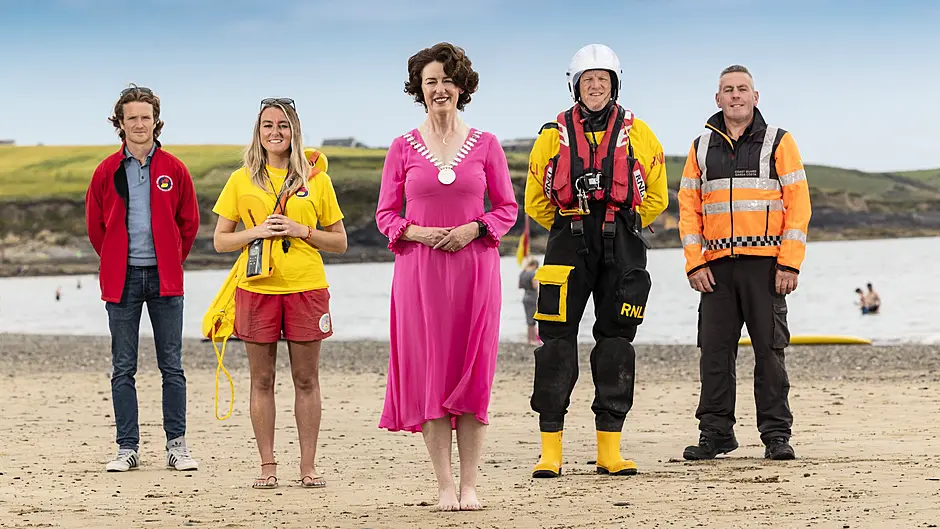Met Éireann, the Health Service Executive, the Department of Health, Cork County Council, the Coast Guard and Water Safety Ireland have all come out to offer people their best advice on how to be safe and well during the heatwave.
The HSE said heat stress, heat exhaustion and heatstroke are potentially serious health risks for people during a heatwave.
In heatwaves, significant increases in mortality can occur due especially in those over 65 years old and more vulnerable groups.
Deaths have occurred at home, in residential care facilities and in hospitals and babies, children, as well as those with underlying health conditions including problems with breathing, heart, kidneys and diabetes are particularly vulnerable.
The public health advice is keep cool; keep your indoor environment cool; keep out the heat and increase shade or cover windows exposed to direct sunlight; use natural ventilation such as open windows when the air feels cooler outside than inside (eg at night) and where it is safe and secure to do so.
People are also advised to increase air flow through buildings but if you are using air conditioning, make sure it is using a fresh air supply, which is important to prevent spread of Covid-19.
Electric fans need to be used with caution, as they may not be safe for higher temperatures and should not be used where a person may be incubating or a case of Covid-19.
People can also dampen their skin to cool down and the need to stay hydrated is vital.
It has been suggested that an adult needs approximately two litres of liquid over 24 hours, but this may be less for smaller people or those with medical conditions.
The advice is to drink more fluids when you feel any dehydration symptoms. The best fluids to drink are water or oral rehydration sachets so talk to your pharmacist about how to use these safely. The rule of thumb is to drink enough during the day so your pee is a pale clear colour.
In situations where you may need medical help, your GP or the Emergency Department. This applies especially if you are confused and disorientated, feel very dizzy, have not peed all day, if you feel like your heart is beating fast, are having fits or seizures, or are caring for someone who is drowsy or difficult to wake.
These can be signs of serious dehydration that need urgent treatment.
Meanwhile, Cork County Council in conjunction with the Irish Coast Guard and Water Safety Ireland are appealing to members of the public to be mindful of their personal safety if they’re visiting the coast this week.
The three organisations have issued guidelines for anyone taking part in coastal walks. They are asking people to stay away from exposed coastal and cliff edges, tell someone where you’re going and to pay attention to tide times and safety signs.
They are also advising people to dress appropriately for the conditions, to wear a high-factor sunscreen and to bring enough food and water for their journey.
Met Éireann has a status yellow high temperature warning remains in place for the entire country and is predicting maximum temperatures of between 25 and 30 degrees for County Cork until Friday.
‘We all appreciate the vital work that the Council’s Beach Lifeguards, Coastguard, and RNLI do on a daily basis, and the last thing anyone wants is to put these vital services under unnecessary strain,’ said the Mayor of County Cork, Cllr Gillian Coughlan (FF).
‘By staying informed and prepared, we can help ensure our own safety and the safety of our family members. Plan your route carefully and keep an eye on the tide times to avoid being cut off by a tidal cutoff.
‘Keep to the path when enjoying our beautiful coastal walkways; keep dogs on leashes and keep a safe distance from cliff edges, which can be extremely unstable. Cork has an unmatched coastline; let us take advantage of it safely.’
Chief Executive of Cork County Council Tim Lucey pointed out that Cork County is home to 19% of the country’s coastline and thousands of people are expected to flock to the seaside to make the most of the good weather.
He reminded visitors to park safely and to ensure that they are not blocking vital access for the emergency services
The Chief Executive Officer of Water Safety Ireland, John Leech highlighted the fact that there will be a full moon on Saturday which will bring with it Spring tides which increases the risk of stranding.
‘Please carry a mobile phone and call 112 and ask for the Coast Guard if you find yourself in difficulty or being cut off by the tide,’ he said.
The Head of Operations with the Coast Guard Gerard O’Flynn said that the number of incidents coordinated by the Coast Guard is at a five-year high and appealed to the public, to at all times to be mindful of their personal safety be it on the water or along the coast.
‘Please ensure that any activity you engage in is being monitored by a colleague who should be aware of your plans and estimated return time,’ he added.
Cork County Council’s Beach Lifeguards are also on full-time duty at 12 beaches. Lifeguards will be on patrol from 10.30am until 7pm at Inchydoney East & West, Owenahincha, The Warren, Tragumna, Barleycove Beaches, Garrylucas and Garretstown.
Finally, of you see somebody in trouble on the water or along the coast use VHF Ch 16 or Dial 112 and ask for Coast Guard.









